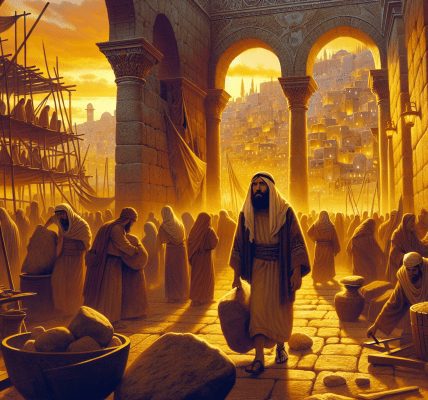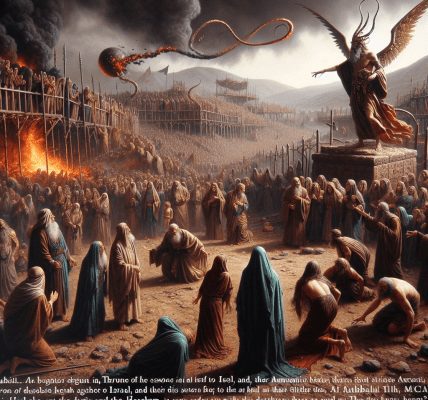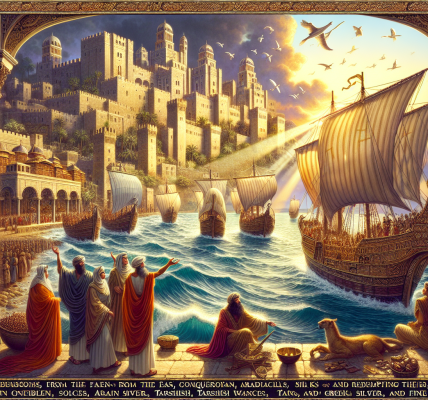**The Reluctant Prophet and the Signs of God**
The sun hung low over the wilderness of Midian, casting long shadows across the rocky terrain. Moses, the shepherd of Jethro’s flock, led the sheep toward Horeb, the mountain of God. The air was dry, and the wind whispered through the crevices, carrying with it the scent of dust and dry grass. It was here, in this desolate place, that the Lord had spoken to him from the burning bush, commissioning him to return to Egypt and deliver the Israelites from Pharaoh’s cruel bondage.
Yet Moses stood motionless, his heart heavy with doubt. *Who am I that I should go to Pharaoh and bring the children of Israel out of Egypt?* The weight of the task pressed upon him like a millstone. He was no longer the prince of Egypt but a fugitive, a shepherd in exile. How could he stand before the mightiest king on earth and demand freedom for his people?
The Lord, patient yet firm, answered him, **”I will be with you. And this shall be the sign to you that I have sent you: when you have brought the people out of Egypt, you shall serve God on this mountain.”**
Still, Moses hesitated. His voice trembled as he protested, **”But behold, they will not believe me or listen to my voice, for they will say, ‘The Lord did not appear to you.’”**
The Lord, knowing the fears of His servant, responded with divine assurance. **”What is that in your hand?”**
Moses looked down. A simple shepherd’s staff—rough, weathered wood, worn smooth by years of use. **”A staff,”** he answered.
**”Throw it on the ground,”** commanded the Lord.
Moses obeyed, and as soon as the staff struck the earth, it writhed and twisted—no longer wood but a living, hissing serpent! He leapt back, his heart pounding, his breath caught in his throat. The creature coiled, its scales glinting in the fading light, its eyes fixed upon him.
**”Reach out your hand and take it by the tail,”** the Lord instructed.
Moses hesitated. To grasp a serpent by the tail was to invite disaster—it could twist and strike in an instant. Yet he steeled himself, reached forward, and seized it. The moment his fingers closed around the creature, it stiffened, its form shifting once more into the familiar wood of his staff.
Awe filled Moses. The power of God was undeniable.
But the Lord was not finished. **”Put your hand inside your cloak,”** He said.
Moses did so, and when he drew it out again, his flesh was white as snow—leprous, decaying before his very eyes. A gasp escaped his lips. The dread disease, the mark of death and uncleanness, now marred his own skin.
**”Now put it back,”** the Lord commanded.
Moses obeyed, and when he withdrew his hand once more, it was restored—whole, healthy, as if nothing had happened.
**”If they will not believe you or listen to the first sign, they may believe the latter sign,”** the Lord declared. **”And if they will not believe even these two signs or listen to your voice, you shall take some water from the Nile and pour it on the dry ground, and the water that you shall take from the Nile will become blood on the dry ground.”**
Yet still Moses wavered. His voice faltered as he pleaded, **”Oh, my Lord, I am not eloquent, either in the past or since you have spoken to your servant, but I am slow of speech and of tongue.”**
The Lord’s reply was swift and unwavering. **”Who has made man’s mouth? Who makes him mute, or deaf, or seeing, or blind? Is it not I, the Lord? Now therefore go, and I will be with your mouth and teach you what you shall speak.”**
But Moses, overcome by fear, begged, **”Oh, my Lord, please send someone else.”**
At this, the anger of the Lord burned against him. Yet in His mercy, He provided a solution. **”Is there not Aaron, your brother, the Levite? I know that he can speak well. Behold, he is coming out to meet you, and when he sees you, he will be glad in his heart. You shall speak to him and put the words in his mouth, and I will be with your mouth and with his mouth and will teach you both what to do. He shall speak for you to the people, and he shall be your mouth, and you shall be as God to him.”**
Moses bowed his head, the weight of his resistance giving way to submission. The Lord had answered every objection, provided every assurance. There was no more room for doubt.
Taking his staff—the same staff that had become a serpent, the same staff that would one day part the Red Sea—Moses turned his face toward Egypt. The journey ahead would be fraught with peril, but the God of Abraham, Isaac, and Jacob walked before him.
And so, with Aaron at his side and the power of the Almighty as his strength, Moses set forth to confront Pharaoh, to demand the release of God’s people, and to fulfill the destiny for which he had been chosen.
The Exodus had begun.




